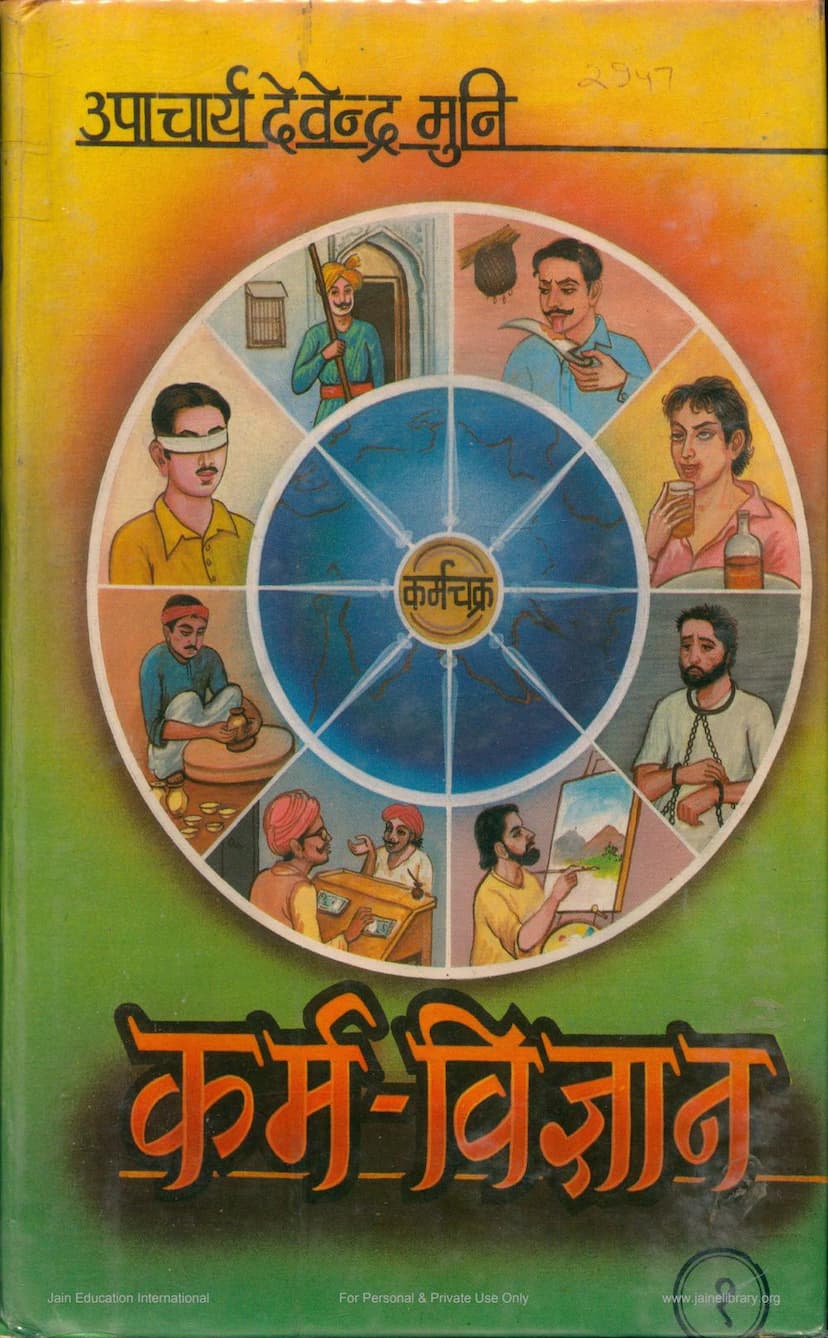Karm Vignan Part 01
Added to library: September 2, 2025

Summary
Here's a comprehensive summary of the Jain text "Karm Vigyan Part 01" based on the provided pages, focusing on the core concepts discussed:
Overall Purpose and Context:
The book, "Karm Vigyan Part 01" by Upacharya Devendramuni, published by Shri Tarak Guru Jain Granthalay, is an extensive exposition of the Jain theory of Karma. It aims to present Lord Mahavir's profound philosophical insights on karma in a simple yet authentic manner, making the intricate subject accessible to the masses. The text emphasizes that understanding the principle of karma is crucial for comprehending the path to spiritual liberation (moksha) and resolving the mysteries of the soul, the divine, bondage, and freedom.
Key Themes and Concepts:
The initial pages of the book lay the groundwork for a deep dive into the science of karma, as understood in Jainism. The core themes explored include:
-
The Centrality of Lord Mahavir's Teachings: The preface highlights that Lord Mahavir's teachings on the soul, divinity, and the path to liberation are the guiding principles of the book. His philosophy is presented as a path to peace and happiness for all beings.
-
The Nature and Scope of Karma:
- Broad Definition: In common parlitions, all actions (like laughing, speaking, walking) are considered karma. However, the text delves deeper, indicating that the concept of karma is much more profound and extensive.
- Distinction from Biological Functions: While every action is karma, certain involuntary bodily functions like breathing, blood circulation, heartbeats, and digestion are not considered karma in the religious-philosophical sense, as they are deemed natural, effortless activities of the physical body.
- Western and Indian Terminology: The text acknowledges that Western languages express karma through words like "activity," "work," or "deed," often categorizing them as "merit" (good karma) and "demerit" (bad karma).
-
The Timeless Nature of Karma (Traikālik Sattā):
- Universal Acceptance: Most theistic philosophies, both Indian and Western, that believe in the existence of the soul, accept the timeless (past, present, future) reality of karma. Jainism, Buddhism, Vedic traditions, and even philosophies like Confucianism, Taoism, and Zen, along with Greek thought, are cited as agreeing on this point. Even Abrahamic religions like Islam and Christianity, while having different interpretations regarding divine intervention, acknowledge the enduring impact of actions.
- Materialist Exceptions: The only exceptions mentioned are Charvaka philosophy in India and Epicureanism in the West, which restrict the influence of karma and its results to the current life. Their reasoning is rooted in their denial of an independent soul and the concept of rebirth.
-
The Jain Perspective on Karma:
- Origin of Karma: Jainism emphasizes that karma is the root of birth and death ("Kamma Jāi Maraṇassa Mūla"). The origin of karma is attributed to delusion or ignorance ("Kamma Mohappabhava Vayanti").
- Detailed Analysis: Jain scriptures extensively analyze the nature and process of karma, exploring even the subtlest activities of the soul in relation to karma. The path to liberation is fundamentally based on this karma theory.
- Vast Body of Literature: Numerous extensive texts like Karm Granth, Kamm Paayadi, Panchsangrah, Kasay Pahud, Mahabandha, and Dhavala are dedicated to the topic of karma, highlighting its centrality and complexity in Jainism.
- Scientific Rigor: The Jain approach to karma is described as "Karm Vigyan" (Science of Karma) due to its logical and scientific methodology.
-
Categorization of Karma (Jain Perspective): The text briefly introduces the eight main types of karma recognized in Jainism:
- Jñānāvaraṇīya (Knowledge-obscuring)
- Darshanāvaraṇīya (Perception-obscuring)
- Vedanīya (Feeling)
- Mohanīya (Delusion/Conduct-attracting)
- Āyu (Lifespan)
- Nāma (Name/Form)
- Gotra (Status/Clan)
- Antarāya (Obstruction) The text promises a detailed discussion on how these karmas bind the soul, their duration, and the process of their severance.
-
The Goal of Jain Karma Theory: The ultimate objective is to understand the bondage of karma and its causes, break the chains of karma, and achieve the soul's liberation and self-sovereignty.
-
Correcting Misconceptions about Karma: The author intends to clarify common misunderstandings, such as the belief that "everything happens due to karmic unfolding (karmoday)." The text clarifies that actions also result from the cessation (kṣaya), partial destruction (kṣayopśama), or non-obstruction (anudaya) of karma. Spiritual progress, for instance, arises from the exhaustion and partial destruction of karmas.
-
Comparative and Harmonizing Approach: The author aims to present a comparative and integrative view, drawing parallels and seeking coordination between Jain karmavigyan and other Indian philosophical schools, as well as modern Western sciences.
-
Structure of the Book (Implied): The book is planned in four sections:
- Section 1: Existence of Karma: Proving the existence of karma through various perspectives, ancient and modern evidence.
- Section 2: Historical Review of Karma Theory: Tracing the evolution of karma theory from prehistoric times and refuting opposing viewpoints.
- Section 3: The Vast Form of Karma: Detailing the various classifications of karma (ghāti-aghāti, dravya-bhāva, etc.) and their immense power.
- Section 4: Utility of Karmavigyan: Discussing its application in spiritual and practical life, its compatibility with socialism, and concepts like the doer and enjoyer of karma.
-
Acknowledgments: The book is dedicated to Upadhyay Shri Pushkarmuniji Maharaj and acknowledges the blessings and support of Acharya Anandrishi Ji Maharaj, Muni Nemichand Ji, Mahasati Pushpavati Ji, Shri J.D. Jain, and Smt. Vidya Jain, highlighting the collaborative effort in bringing this significant work to fruition.
In essence, "Karm Vigyan Part 01" serves as a foundational text that meticulously introduces the Jain understanding of karma, establishing its scientific basis, philosophical depth, and its absolute necessity for achieving spiritual liberation.